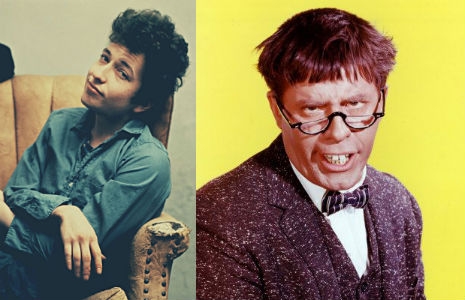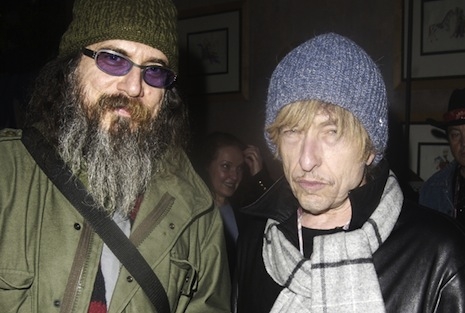
Larry Charles is a force in contemporary comedy, but to most people he’s little more than a name. Odds are pretty decent that he’s been involved in the creation of something you love—he was a staff writer for Seinfeld for five years; he directed three Sacha Baron Cohen movies, including the immortal 2006 release Borat: Cultural Learnings of America for Make Benefit Glorious Nation of Kazakhstan; he was executive producer on The Tick; he has directed more than a dozen episodes of Curb Your Enthusiasm.
Clearly, if you look at that resume, Charles can count Jerry Seinfeld, Baron Cohen, and Larry David as some of his most fertile collaborators. But he has a significant collaborator that hasn’t garnered as much notice—that being Bob Dylan. In 2003 Charles released his first directorial feature, a star-studded “comedy-drama” (per Wikipedia) called Masked and Anonymous, with Bob Dylan as number 1 on the call sheet, as they say in Hollywood (i.e., the top-billed actor). Charles directed the movie, and Dylan and Charles co-wrote it, using the pseudonyms Sergei Petrov and Rene Fontaine, respectively.

Larry Charles and Bob Dylan
But that (likely somewhat mixed-up) feature started its existence as an HBO pitch for a “slapstick comedy” TV series with Bob Dylan in the lead role—a pitch that was green-lighted after a bizarre meeting with the head of the premium cable network. Charles was on Pete Holmes’ podcast You Made It Weird recently and told the entire story. (In the podcast the story starts around an hour and 26 minutes in, but someone has helpfully created a YouTube video of that section, which we’ve embedded below.)
I’ve transcribed a couple of sections from the story, but it’s rather long (10 minutes) and suitably aimless, being a podcast. Dylan lovers should really listen to the whole thing. The story starts out as follows:
I got a call that he was interested in doing, he’d been on the road, he does this endless tour, he’s on this tour all the time, he’s on this bus, most of the time. And he’s got a TV, this was back in the ‘90s, he’s got a TV in the bus and he watches movies and he gets into certain genres of movies, and he gets like addicted to them and just watches every single one of them. And he had been watching Jerry Lewis movies. And he’d gotten deeply into Jerry Lewis, and he wanted to make a slapstick comedy. ... He wants to do it as a TV series for HBO, so I’m called in to meet with him. He wanted to star in it, almost like a Buster Keaton or something.
There’s a great section where Charles and Dylan meet in the back of a boxing gym that Dylan owns, that’s also connected to a coffee shop, and Dylan is playing mind games with Charles, whom he’s meeting for the first time, by drinking out of his guest’s ice coffee glass just to see how he’ll react. There’s also a lengthy bit about Dylan’s writing process, at least at that date—suffice it to say that it involves writing snatches of text on whatever scraps of paper are at hand and cobbling something together later on. Very “oblique strategies.” Says Charles, “We wrote like a very elaborate treatment for this slapstick comedy, which is filled with surrealism and all kinds of things from his songs and stuff.”
Eventually they go to meet with the president of HBO, Chris Albrecht. At the meeting, Charles is wearing pajamas, which was his habit for a couple of years around then, and Dylan is dressed like a cowboy, all in black. Albrecht attempts to break the ice by bringing up Woodstock, to which Dylan says (pretty reasonably), “I didn’t play Woodstock.” After that Dylan spends the entire meeting standing with his back to the group staring out the window. At this point Charles’ agent Gavin Polone leans over to Charles and whispers, referring to Dylan, “Retarded child.”
However, despite all of that, they do in fact come to an agreement on a deal to do a slapstick TV series starring, of all people, Dylan. As they’re walking out to the elevator, Charles and Polone and Dylan’s agent, Jeff Kramer, are of one mind about the project to come, but Dylan’s head is elsewhere. As Charles tells it: “The three of us are elated, we actually sold the project, and Bob says, ‘I don’t want to do it anymore. It’s too slapstick-y.’ He’s, like, not into it. That’s over. The slapstick phase is officially ended.”
So instead they worked for another year or so on Masked and Anonymous.





